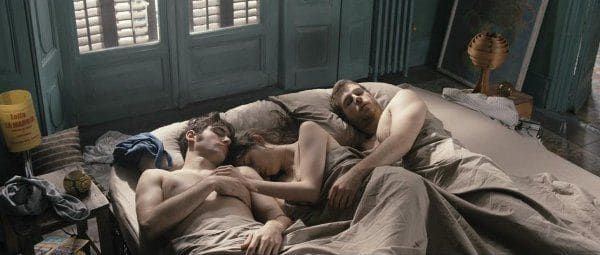Eye For Film >> Movies >> The Sex Of The Angels (2012) Film Review
The Sex Of The Angels
Reviewed by: Jennie Kermode

Carla (Astrid Bergès-Frisbey) loves Bruno (Llorenç González). Forever and ever, even if her parents disapprove. And Bruno loves Carla. But love can be a complicated thing. When Bruno meets martial arts instructor Rai (Álvaro Cervantes), he finds himself experiencing feelings he had not thought possible. He still loves Carla. What is to be done?
The Sex Of The Angels is a visually rich, gracefully composed film with something much subtler to express through the frantic hyperbole of young protagonists who struggle to undertand themelves. Carla and Bruno have been together since they were 15. Their love is innocent, utterly lacking in self-awareness. Carla frets over her mother's acceptance of her father's philandering, unwilling to accept that this apparently confident woman can be getting anything out of staying in her relationship. Bruno's betrayal not only distresses her on a personal level but upsets her whole world view. Meanwhile, Bruno is confused by a world that expects him to be either gay or straight. Rai seems comfortable with both bisexuality and multiple partner relationships, but doesn't see fit to provide much support in this regard, and as the story develops it becomes clear that he has issues of his own - that he is, perhaps, the least willing to take chances.

There are many different issues to explore here, from the (sadly unchallenged) notion that a bisexual person 'needs' both male and female lovers to questions around what constitutes faithfulness, what commitment really means and how different people's boundaries can vary. At one point Carla's friend makes the cutting observaton that what really seems to be upsetting her is Bruno's interest in one person, implying that she'd be happier if he'd taken the more socially acceptable route of just sleeping around. The weight of convention weighs heavily on the troubled young woman. If she stays with Bruno, will she face public mockery? Ought she to assert her identity as a modern, independent woman by refusing ever to speak to him again? Carla works as a photographer at a small magazine, which broadens the perspectives available on this difficulty with balancing the private and the public - personal relationships having an impact on friends and colleagues too, after all.
The emotional ups and downs of this film being dramatic, it would be easy to lose patience with the characters, but strong acting keeps us with them. Bergès-Frisbey is extraordinary, combining fierce expressiveness with heartbreaking fragility. González givs his character a vulnerable edge that makes his troubles apparent even when he might be assumed to have all the advantages. Cervantes is the weakest of the three, but has the most difficult job to do, portraying a character who is much more emotionally reticent and can too easily be read as a villain. In a story where ambiguity is critical, it's vital that the balance between the three of them be maintained, and for the most part, it is.
It's disappointing, then, that the film veers off into melodrama just before the end. Also problematic is its tendency towards an orthodoxy and neatness in storytelling that denies us more intriguing possibilities. In so far as it goes, however, it's a bold attempt to raise challenging quesions about life, love and personal identity. It's also highly erotic, with intense sexual chemistry between the actors; and in the rare scenes where nobody's sulking, it has real joie de vivre. Well worth a look.
Reviewed on: 20 Feb 2013
















